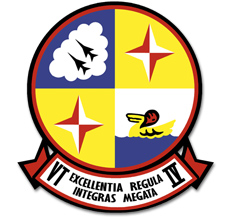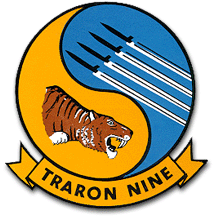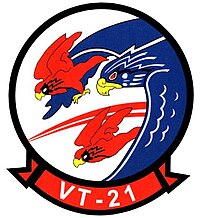
The McDonnell DouglasT-45 Goshawk is a highly modified version of the British BAE Systems Hawk land-based training jet aircraft. Manufactured by McDonnell Douglas and British Aerospace, the T-45 is used by the United States Navy as an aircraft carrier-capable trainer.

The Douglas A-4 Skyhawk is a single-seat subsonic carrier-capable light attack aircraft designed and produced by the American aerospace manufacturer Douglas Aircraft Company, and later, McDonnell Douglas. It was originally designated A4D under the United States Navy's pre-1962 designation system.

The North American T-2 Buckeye was the United States Navy's intermediate training aircraft, intended to introduce U.S. Navy and U.S. Marine Corps student naval aviators and student naval flight officers to jets. It entered service in 1959, beginning the replacement process of the Lockheed T2V SeaStar, and was itself replaced by the McDonnell Douglas T-45 Goshawk in 2008.
A naval flight officer (NFO) is a commissioned officer in the United States Navy or United States Marine Corps who specializes in airborne weapons and sensor systems. NFOs are not pilots (naval aviators), but they may perform many "co-pilot" or "mission specialist" functions, depending on the type of aircraft. Until 1966, their duties were performed by both commissioned officer and senior enlisted naval aviation observers (NAO).

VT-4 Training Squadron 4 is a training squadron of the United States Navy. Initially established as Basic Training Group NINE (BTG-9) in the 1950s, the squadron was redesignated as Training Squadron FOUR (VT-4) on May 1, 1960 and based at Naval Air Station Pensacola, Florida.

Naval Air Station Pensacola or NAS Pensacola, "The Cradle of Naval Aviation", is a United States Navy base located next to Warrington, Florida, a community southwest of the Pensacola city limits. It is best known as the initial primary training base for all U.S. Navy, Marine Corps and Coast Guard officers pursuing designation as naval aviators and naval flight officers, the advanced training base for most naval flight officers, and as the home base for the United States Navy Flight Demonstration Squadron, the precision-flying team known as the Blue Angels.

Naval Air Station Whiting Field is a United States Navy base located near Milton, Florida, with some outlying fields near Navarre, Florida, in south and central Santa Rosa County, and is one of the Navy's two primary pilot training bases. NAS Whiting Field provides training for U.S. Navy, U.S. Marine Corps, Coast Guard, and Air Force student pilots, as well as those of several allied nations. NAS Whiting Field is home to Training Air Wing Five.

Naval Air Station Meridian or NAS Meridian is a military airport located 11 miles northeast of Meridian, Mississippi in Lauderdale County and Kemper County, and is one of the Navy's two jet strike pilot training facilities.

A naval aviator is a commissioned officer or warrant officer qualified as a crewed aircraft pilot in the United States Navy or United States Marine Corps. United States Coast Guard crewed aircraft pilots are officially designated as "Coast Guard aviators", although they complete the same undergraduate flight training as Navy and Marine Corps crewed aircraft pilots, and are awarded the same aviation breast insignia.

Marine Fighter Attack Training Squadron 101 (VMFAT-101) was a United States Marine Corps F/A-18 Hornet training squadron. The squadron was last based at Marine Corps Air Station Miramar, California and fell under the command of Marine Aircraft Group 11 (MAG-11) and the 3rd Marine Aircraft Wing.

The VT-9 Tigers is one of four U.S. Navy strike jet training squadrons and one of two based at Naval Air Station Meridian in Mississippi.

Training Squadron TEN (VT-10) is a training squadron of the United States Navy. The squadron is homebased at NAS Pensacola, Florida.

Training Squadron EIGHT SIX (VT-86), also known as the "Sabrehawks," is a United States Navy advanced jet training squadron based at the Naval Air Station Pensacola, Florida. Training Squadron 86 is a tenant command of Training Air Wing 6. They are a training squadron flying the T-45C Goshawk. Their tailcode is F and their radio callsign is ROKT.

Naval Air Station Kingsville or NAS Kingsville (NASK) is a United States Navy Naval Air Station located approximately 3 miles east of Kingsville, Texas in Kleberg County. NAS Kingsville is under the jurisdiction of Navy Region Southeast and is the headquarters of Training Air Wing Two. The station also operates a nearby satellite airfield, NALF Orange Grove.
Lucy Young is an American naval officer. In 1980 she became the first woman to qualify in Naval Air Combat Maneuvering (ACM). After that, she became an ACM instructor. At that time, female aviators were forbidden from combat duty stations. After she retired from the Navy, she got a job at a legacy carrier and became one of the first female captains.

The Naval Air Training Command (NATRACOM) is a one-star Echelon III command that conducts flight training of student Naval Aviators, and Naval Flight Officers. Though it does not conduct Naval Aircrew training which is conducted by Naval Education and Training Command's Naval Aviation Schools Command (NASC), it is responsible for monitoring the production of Aircrewmen through the Naval Aviator Production Process (NAPP). Through the NAPP, NATRACOM is also responsible for programming and monitoring the production of all Navy and Marine Corps Fleet Replacement Squadrons.

Training Squadron 22 (VT-22) or TRARON TWO TWO, known as the Golden Eagles, callsign "Blazer", is a U.S. Navy strike jet training squadron stationed aboard Naval Air Station Kingsville, flying the T-45C Goshawk. The Golden Eagles are one of four strike jet training squadrons in operation today, and are under the command of Training Air Wing Two.

Training Air Wing TWO is a United States Navy aircraft training air wing based aboard Naval Air Station Kingsville, in Kingsville, Texas. TW-2 is one of five training air wings in the Naval Air Training Command, and consists of two jet training squadrons. The wing trains Student Naval Aviators from the U.S. Navy, U.S. Marine Corps, and international allies. Following completion of primary flight training and selection of an advanced training pipeline, Student Naval Aviators are assigned to TW-2 for either intermediate and advanced strike pipeline training or advanced E-2/C-2 training in the T-45C Goshawk jet training aircraft.

Training Air Wing ONE is a United States Navy aircraft training air wing based aboard Naval Air Station Meridian, located 11 miles northeast of Meridian, Mississippi in Lauderdale County and Kemper County. TW-1 is one of five training air wings in the Naval Air Training Command, and consists of two jet training squadrons. The wing trains Student Naval Aviators from the U.S. Navy, U.S. Marine Corps, and international allies. Following completion of primary flight training and selection of an advanced training pipeline, Student Naval Aviators are assigned to TW-1 for either intermediate and advanced strike pipeline training or advanced E-2/C-2 training in the T-45C Goshawk jet training aircraft.

Training Squadron SEVEN (VT-7), known as the Eagles, is one of four U.S. Navy strike jet training squadrons and one of two based at Naval Air Station (NAS) Meridian. VT-7, along with Training Squadron NINE (VT-9), make up Training Air Wing One of the Naval Air Training Command. In addition to providing advanced training for strike jets, VT-7 provides additional advanced training for airborne early warning and carrier onboard delivery aircraft. VT-7 also trains United States Marine Corps (USMC) aviators and select foreign military pilots.























